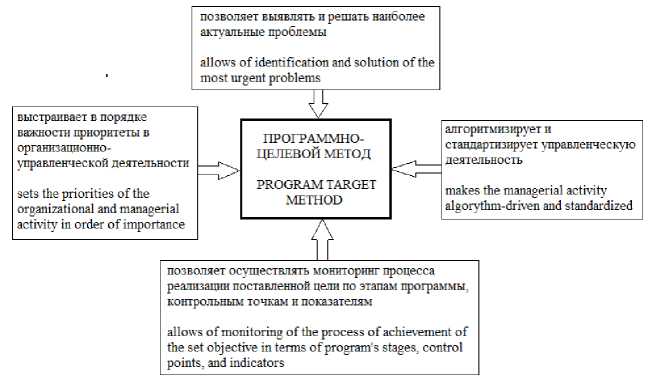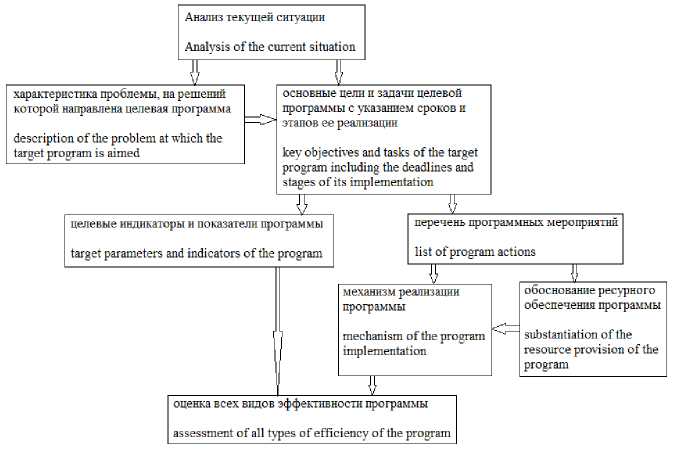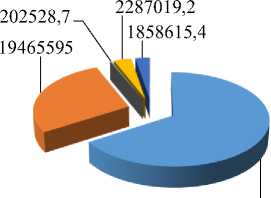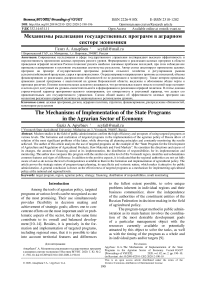The mechanisms of implementation of the state programs in the agrarian sector of economy
Автор: Apyrbaev G.A.
Журнал: Вестник Воронежского государственного университета инженерных технологий @vestnik-vsuet
Рубрика: Экономика и управление
Статья в выпуске: 2 (84), 2020 года.
Бесплатный доступ
Modern studies in the field of public administration confirm the high efficiency and prospects of using targeted programs at various levels. The formation and realization of targeted programs in the implementation of the agrarian policy of Russia allow of solution of the most significant problems of the latter, while observing all planning principles and constantly monitoring the results achieved. The author of this article analyzes the use of targeted programs on the example of the “State Program for the Development of Agriculture and Regulation of Agricultural Products, Raw Materials and Food Markets”. He considers the directions and causes of its changes, the amount of financing aimed at its implementation, the distribution of responsibilities for its implementation and monitoring. The author also compares this program with the similar one at the level of the Voronezh region, identifies and substantiates common features and signs of difference. In addition to the positive aspects, it is indicated that the regional authorities are not yet fully aware of and so do not use the level of independence available to them in the formation and implementation of agricultural policy. The article proves the strategic nature of program-target planning, its specificity and systemic nature, which makes it attractive for public administration. A general conclusion is drawn on the effectiveness of targeted programs as a mechanism for implementing agricultural policy at the national and regional levels.
Target program, region, agrarian policy, strategy, financing, distribution of responsibilities, result monitoring
Короткий адрес: https://sciup.org/140250996
IDR: 140250996 | DOI: 10.20914/2310-1202-2020-2-190-196
Текст научной статьи The mechanisms of implementation of the state programs in the agrarian sector of economy
Among the tools of agrarian policy, targeted programs at various levels can be recognized as one of the most promising. Their use simultaneously provides flexibility in decision making and achievement of strategic goals; allows one to concentrate efforts on the most important and / or problematic aspects of the sector, but at the same time contribute to its overall and balanced development [10–14]. Besides, it is precisely in the formation and implementation of targeted programs, including regional ones, that it is possible to take into account territorial features and differences to the fullest extent possible, to solve unique problems inherent in individual regions and their business communities; show the independence of the authorities of the constituent entities of the Russian Federation in decision-making in the field of agricultural policy.
The program-target method in public administration as its main feature involves the coordination of the most desirable development goals of a particular management object with the resources currently available or potentially attracted by this object to solve the tasks, as well as with the timing of the program as a whole and its individual parts and/or targets [9].
This is an open access article distributed under the terms of the Creative Commons Attribution 4.0 International License
Among the main characteristics of target programs, we consider it necessary to highlight the following and emphasize their importance and relevance:
─ comprehensive nature: the problems stated in the program and ways to solve them, first of all, imply comprehensiveness, a combination of methods, the use of resources of different types, and performers of different qualifications and terms of reference;
─ strategic nature: this type of plan documents by its nature is not intended to solve small, local, or short-term problems, government programs usually solve the problems affecting the country's security and its socio-economic development;
─ specifity: the program is not so much a list of goals and objectives as activities aimed at achieving them;
─ consistency: not only the tasks and resources, but also the events and their executors within the program are closely linked, and in general the document involves the use of system properties, such as synergy and emergence;
─ the program as an instrument for the implementation of state functions: government agencies are responsible for both developing and implementing the programs, which, on the one hand, makes it possible to directly control and manage their execution, but on the other hand, does not imply transfer of state responsibility to any other structures and institutions of society;
─ focus on transformation [4]: government programs by their very nature imply significant changes in the controlled subsystem, if possible – achieving its qualitative shift in the desired direction.
The advantages of using the program-target method in public administration can be represented in the form of figure 1.

Рисунок 1. Преимущества применения программно-целевого метода в государственном управлении
Figure 1. Advantages of using the program-targeted method in public administration
In addition to these advantages, referring to the work of A.A. Guzhin and G.N. Guzhina [3], we can further highlight the possibility of assessing medium and long-term effects, including economic; transparency and openness of planning and financing; transparency of operations in the framework of the implementation of state programs, including the implementation of public procurement; the ability to adjust programs in case of need.
Results
Until now, the main program-target planning document in the field of state regulation and support of agriculture and related industries is the "State Program for the Development of Agriculture and Regulation of Agricultural Products, Raw Materials and Food Markets", approved by the Decree of the Government of the Russian Federation of July 14, 2012, No 717, in which subsequent Decisions made changes and additions: first in 2013 and 2014, then – several times a year – in 2017, 2018 and 2019. Such active work on the modification of the state program once again proves that the program-targeted management method involves the possibility of adjusting plans, while not violating the principles of consistency [6], flexibility (dynamism) [7] and continuity of planning. The enacted State Program remains living instrument, actively adapting to the changing situation, thus retaining a constantly high degree of relevance.
The implementation period of the Program under consideration is 2013–2025, but recently the Ministry of Agriculture of the Russian Federation has been working on the issue of its extension until 2030, in order to facilitate the coordination of its activities with another program – the State Program "Integrated Development of Rural Areas", approved by the Government Decision of May 31, 2019 No. 696, which is also planned to be extended until 2030.
The total amount of financial support for the State Program is 8212152839.7 thousand rubles, the responsible executor is the Ministry of Agriculture of the Russian Federation. The Program was developed and approved in order to implement the main provisions of the Federal Law "On the Development of Agriculture" and provides for two stages of implementation, the second began on January 1, 2018.
The structure of the state program in the context of its subprograms is adjusted over time [11]. These changes are inherently transformations of the understanding of the priorities among the tasks facing the program as a whole and the tools that contribute to their solution. However, the main goals of the program remain stable and consist, first of all, of ensuring the food sovereignty of the country and increasing the competitiveness of its companies. After the introduction of sanctions and countersanctions in 2014–2015, the achievement of the
As Professor B.A. Voronin et al. [2] points out, the main goal of this and other programs in the implementation of Russia's agrarian policy is to achieve and maintain food security at the national level, and to increase the competitiveness of agricultural producers and their products on the domestic and world markets.
In accordance with theoretical recommendations and practical experience in application of the program-targeted management method, programs have a unified structure that is used regardless of the goals, scope, and level of the program. We understand the relationship between the sections of target programs as shown in figure 2.

Рисунок 2. Взаимосвязь между разделами целевых программ
Figure 2. Relationship between the sections of target programs
The formation of programs in the implementation of regional agrarian policy should be carried out in accordance with the same procedural approaches as at the federal level.
Regional programs in the field of development and support of agriculture and the implementation of agrarian policy in all its manifestations are formed in conjunction with regional development strategies, and strategic planning at the regional and municipal levels is charged with the responsibility of the authorities at the appropriate levels in accordance with federal law “On strategic planning in the Russian Federation”. Both regional development strategies and regional target programs involve taking into account expected changes in economic and social life, attention to natural and historical specific conditions in certain territories, assessment and maximization of the use of the existing potential (including production, intellectual, human, technological, institutional, etc.). The strategic planning system in the region includes the program-targeted method as one of its instrumental elements. Speaking specifically about the regional targeted programs in the field of agriculture, they are among the most important means of implementing agrarian policy in general and of all its main subsystems:
-
• agro-social;
-
• agro-environmental;
-
• structural;
-
• – infrastructural;
-
• – international.
According to E.A. Myagkova [5], the application of the program-target method in regional agrarian policy pursues the most important qualitative transformation of the latter: the transformation of its inner essence and capabilities from “resource forecasting” to “effective planning”.
However, the same author emphasizes that at present regional authorities often misunderstand the possibilities and purposes of the program-target method. More often, he sees to them as an effective
Апырбаев Г.А. Вестник ВГУИТ, 2020, Т. 82, №. 2, С. 190-196 means of attracting budget funds, while this method can and should be much more effective as an activator of its own resources of the territory.
In the Voronezh region, as well as in other constituent entities of the Russian Federation, active work has been carried out in recent years to develop and adopt comprehensive targeted programs for the development of agriculture. This activity is carried out in accordance with the goals and principles of agrarian policy and does not contradict the letter and spirit of the federal programs. The main of such programs is the State program of the Voronezh region “Development of agriculture, food production and the infrastructure of the agro-food market”, approved by the Government of the Voronezh region dated December 13, 2013 No 1088. Over the past three years, the program has undergone a thorough review, which was reflected in its alterations and amendments dated several dates in 2017, 2018, and 2019.
Within the framework of this program of the Voronezh region in its version of February 15, 2017 No 121 (the last when changes were made to the internal structure), 18 subprograms operate, that is, two times more than in the similar federal program. Consideration of the ratio of subprograms as part of agricultural development programs at the federal and regional levels proved complex interconnection and coordination of the objectives and tasks. In our opinion, it demonstrates positive features of this program of the Voronezh region such as:
-
• high degree of independence in its preparation;
-
• great attention to the features of the state and level of development of individual agricultural sub-sectors, the most important and promising for the region in question;
-
• thorough consideration of the program, which follows, inter alia, from the number of subprograms;
-
• taking into account the features and capabilities of the economy of the region as a whole.
Thus, we consider it possible to draw a conclusion about the full and deep use of the capabilities of the program-targeted management method at least at the planning level in the Voronezh region, that is, in the formation and adjustment of the State program of the Voronezh region “Development of agriculture, food production and infrastructure agro-food market”.
The program-target planning, which resulted in the state programs considered above, was carried out in full accordance with the logical scheme of this process, summarized by E.I. Balalova and T.V. Rudakova [1] (figure 3).

Целеполагание - определение целей социально-экономического развития
Осознание и формирование целей, исходя из существующих проблем, потребностей, желаний, доктрин

Систематизация целей
Target-setting as identification of the targets for the social and economic development of the object

Структуризация целей на основе построения дерева целей и
Realization and definition of the targets in accordance with the existing problems, needs, wishes, ideas
Target arrangement
Определение способов решения

Target arrangement based on the design of the aims and tasks tree
Формулировка взаимоувязанных мероприятий, позволяющих решать поставленные задачи по достижению целей
Выявление средств для реализации способов
Definition of the ways to achieve the set targets

Articulation of the mutually' connected actions allowing of solution of the set tasks for the target achievement
Контроль и корректировка целей и
Identification of the means for the ways' implementation

Identification of the resource base (their availability and sources) for inpiementation of the program actions within the time limits
Определение ресурсной базы (их наличия и источников получения) для реализации программных мероприятий в намеченные сроки
Разработка организационно-экономических механизмов контроля реализации и корректировки намеченных мероприятий

Target and task control and adjustment
Development of the organizational and economic control mechanisms for the implementation and adjustment of the planned actions
Рисунок 3. Логическая схема программно-целевого планирования
Figure 3. Logical scheme of the program-target planning
The effect of the application of target-oriented planning arises as a result of its ability to link goals with the means of achieving them (resources and methods), as well as procedures and indicators for monitoring, which allows of achievement of the planned result at the appointed time and without overspending resources. However, planning can only yield results in the implementation of plans and programs, which requires an effective mechanism. The mechanism for the execution of state programs is fixed in the Federal Law “On Strategic Planning in the Russian Federation”. It is an organizational tool that implies the formation and effective implementation of the entire system of activities laid down in the program, in their complex and mutual coordination, as well as the definition and regular monitoring of the indicators that allows of control of the achievement of the final and intermediate results set by the program.
post@vestnik-vsuet.ru Discussion
The basis of the mechanism for implementing state programs is the distribution of powers and responsibilities of individuals and organizations. The developers and key executors of the State program of the Voronezh region “Development of agriculture, food production and the infrastructure of the agro-food market” are presented in the diagram (figure 4).
Ответственный исполнитель программы
Program's executor in chief
Департамент аграрной политики Воронежской области
Department of agrarian policy of the Voronezh region

Управление ветеринарии Воронежской области
Veterinary department of the Voronezh region
Управление государственного технического надзора Воронежской области
Public technical control department of the Voronezh region


Департамент дорожной деятельности Воронежской области
Road maintenance department of the Voronezh region
Рисунок 4. Разработчики и основные исполнители Государственной программы Воронежской области
Figure 4. The developers and key executors of the State program of the Voronezh region
Combining the functions of program developers and executors in the form of three structures is an important step towards ensuring, on the one hand, the program’s realism at the stage of its formation and adjustment, and, on the other hand, increasing the motivation for executors to successfully achieve the target parameters of the program.
Achievement of the planned indicators for the implementation of state programs is impossible without sufficient funding for their activities and the effective use of allocated funds. Thus, the financing of the State program of the Voronezh region “Development of agriculture, food production and the infrastructure of the agro-food market” for 2014–2020 amounted to 69811246.0 thousand rubles, and the structure of the sources of these funds is shown in figure 5. The main source, which forms almost two-thirds of the estimated costs is the federal budget.

■ Federal budget, 65.89%
■ Regional budget, 27.88%
■ Local budgets, 0.29%
■ Legal enitities' funds, 3.28%
■ Physical entities' funds, 2.66%
45997487,6
Рисунок 5. Объем и структура финансирования Государственной программы Воронежской области за 2014–2020 годы
Figure 5. The volume and structure of financing of the State program of the Voronezh region in 2014–2020
The developers of the program perform the following actions as part of the formation of a mechanism for its implementation:
─ determine the amount of necessary funds to finance planned activities for certain periods, sources of their obtaining and subprograms (directions);
─ develop the procedures for filing applications for funds (a set of necessary documents with their templates, deadlines, conditions for consideration), appoint persons / organizations responsible for receiving and checking those documents;
─ organize informing the interested parties about the procedure for obtaining financing.
The executors of the State program, and first of all, the Executor in Chief represented by the Department of Agrarian Policy of the Voronezh Region, are responsible for the following results and actions:
─ achievement of the target indicators of the program due to the timely, complete, and correct implementation of all the activities set by it;
─ coordination of the program with the activities stipulated by other strategic planning documents of the regional and federal levels;
─ direct management of the implementation of the measures envisaged, including coordination of the work of all involved individuals and organizations;
─ approval of the directions and objects of financing;
─ current and final control over the implementation of the program and the achievement of the target indicators;
─ generation of reports on the results of work and their submission to higher authorities and other interested parties.
Both regulatory documents on the content and approval of the program, and the information on the progress and results of its implementation, as well as planned and actual volumes of financing, are posted in open sources, in particular, on the websites related to the activities of the Department of Agrarian Policy of the Voronezh Region and others involved structures.
According to paragraph 5 of Art. 44 of the Law "On Strategic Planning in the Russian Federation", "an annual assessment of the effectiveness of the implementation of each state program of a constituent entity of the Russian Federation is carried out. The procedure for conducting this assessment and its criteria are established by the supreme executive body of state authority of the subject of the Russian Federation”.
Conclusion
Thus, it must be recognized that state programs in the field of regulation and ensuring the development of agriculture have established themselves as a modern and effective mechanism for the practical implementation of national and regional agrarian policies, and it is with respect to the latter that they provide maximum opportunities for the correct implementation of its principles and goals. However, to date, the potential use of the program-target method in implementing regional agrarian policies has not been fully recognized by the authorities in many constituent entities of the Russian Federation, and therefore cannot be realized fully and effectively.
Список литературы The mechanisms of implementation of the state programs in the agrarian sector of economy
- Балалова Е.И., Рудакова Т.В. Роль и место программно-целевого управления в развитии малых форм хозяйствования и кооперационных связей в системе регионального агропромышленного комплекса // Фундаментальные и прикладные исследования кооперативного сектора экономики. 2019. № 3. С. 16-23.
- Воронин Б.А., Светлаков А.Г., Шарапова В.М. Программно-целевой метод управления сельским хозяйством как фактор конкурентоспособности // Аграрный вестник Урала. 2012. № 5 (97). С. 91-94.
- Гужин А.А., Гужина Г.Н. Программно-целевой метод управления государственной службой // Инновационное развитие социально-экономических систем: условия, результаты и возможности: материалы IV международной научно-практической конференции. Орехово-Зуево, 2016. С. 69-72.
- Гужина Г.Н. Оценка эффективности управления // Вестник Московского государственного областного гуманитарного института. Серия: История, философия, политология, право. 2014. Т. 2. № 1-1 (1). С. 49-52.
- Мягкова Е.А. Использование программно-целевого метода в планировании развития сельского хозяйства региона // Теория и практика мировой науки. 2017. № 8. С. 27-29.
- Степаненко Е.И. Планирование как функция менеджмента // Экономические и гуманитарные науки. 2011. № 10. С. 112-115.
- Терновых К.С., Плякина А.А. Эффективность бюджетного планирования в системе управления интегрированными агропромышленными формированиями // Экономика и предпринимательство. 2017. № 9-2 (86-2). С. 1113-1118.
- Shellabarger R.M., Voss R.C., Egerer M. Challenging the urban-rural dichotomy in agri-food systems // Agriculture And Human Values. 2019. № 1(36). P. 91-103.
- Triana Riveros J.L., Gomes Junior N.N. Agrarian Social Policies In The Colombian State: A Systematic Review Of The Literature // Humanidades&Inovacao. 2019. № 17(6). P. 34-43.
- Wang S.W., Manjur B., Kim J.-G. Assessing Socio-Economic Impacts of Agricultural Subsidies: A Case Study from Bhutan // Sustainability. 2019. № 12(11).
- Zlolniski, C. Coping with precarity: subsistence, labor, and community politics among farmworkers in northern Mexico // Dialectical Anthropology. 2019. № 1(43). P. 77-92.
- Darko R.O. et al. Irrigated agriculture for food self-sufficiency in the sub-Saharan African region // International Journal of Agricultural and Biological Engineering. 2020. V. 13. №. 3. P. 1-12.
- Wang L. et al. The impacts of agriculture on macroinvertebrate communities: From structural changes to functional changes in Asia's cold region streams // Science of the total environment. 2019. V. 676. P. 155-164.
- Mehra M., Singh C. K. Identification of resource management domain-specific best practices in the agriculture sector for the Mewat region of Haryana, India // Environment, Development and Sustainability. 2019. V. 21. №. 5. P. 2277-2296.


